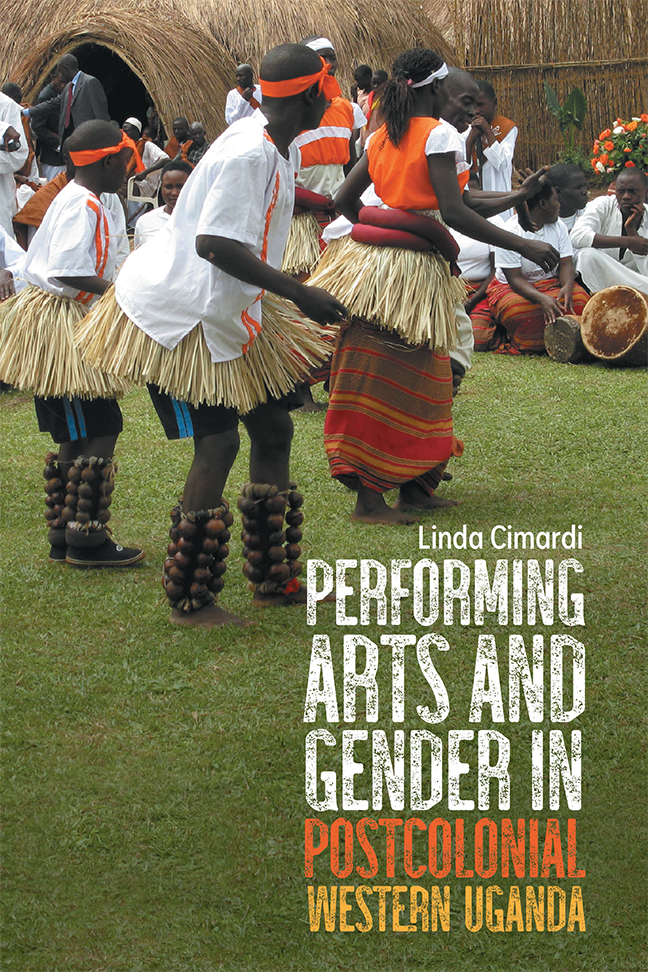Book contents
- Frontmatter
- Contents
- List of Illustrations
- Foreword
- Acknowledgments
- Note on Language
- Note on the Musical Examples
- Note on Online Audio and Video Material
- Prelude: Encountering Local Culture in Western Uganda
- Introduction: Approaching Gender and Performing Arts in Bunyoro and Tooro
- One “Traditional Dance Preserves Culture and Shows People How to Behave”: Runyege, MDD, and Gender
- Two Singing Marriage, Runyege, and Labor
- Three “Women Aren't Supposed To”: Instrument Playing in the Past and Today
- Four Shaking the Hips, Stamping the Feet: The Runyege Dance
- Five Narrating and Representing Local Culture: Theater in Songs and Dances
- Six Trans-Performing and Morality in Cultural Groups
- Postlude: Gendering Culture
- I Glossary of Terms in Runyoro-Rutooro
- II Historical Recordings from Bunyoro and Tooro
- Author's Interviews
- References
- Index
Four - Shaking the Hips, Stamping the Feet: The Runyege Dance
Published online by Cambridge University Press: 17 December 2023
- Frontmatter
- Contents
- List of Illustrations
- Foreword
- Acknowledgments
- Note on Language
- Note on the Musical Examples
- Note on Online Audio and Video Material
- Prelude: Encountering Local Culture in Western Uganda
- Introduction: Approaching Gender and Performing Arts in Bunyoro and Tooro
- One “Traditional Dance Preserves Culture and Shows People How to Behave”: Runyege, MDD, and Gender
- Two Singing Marriage, Runyege, and Labor
- Three “Women Aren't Supposed To”: Instrument Playing in the Past and Today
- Four Shaking the Hips, Stamping the Feet: The Runyege Dance
- Five Narrating and Representing Local Culture: Theater in Songs and Dances
- Six Trans-Performing and Morality in Cultural Groups
- Postlude: Gendering Culture
- I Glossary of Terms in Runyoro-Rutooro
- II Historical Recordings from Bunyoro and Tooro
- Author's Interviews
- References
- Index
Summary
L: Where and when did you learn to dance?
K: I started in primary school, then continued dancing in secondary and entered a cultural group… I also tried runyege, but I was not good at rattling. I am better in kucweka [omugongo].
L: But would you like to dance runyege instead of mugongo?
K: I love mugongo.
L: Which are the comments when you perform very well?
K: [laughs] Some people said kacwa basaija mugongo, “She [can] break men's lower back.”
L: And which are the comments when you don't dance well or they don't like the performance?
K: I always dance well.
—Interview by author (L) with Annette Katusime (K). Masindi: August 23, 2018.L: How did traditional performing arts enter your life?
M: I learned to dance in primary school. I liked rattling runyege and had talent for it. So I continued in secondary school and got involved in a cultural group.
L: What is the significance of runyege for you?
M: Runyege is my culture. Dancing is preserving and showing our tradition. For me, I can express myself and interact with other performers. It is also good for earning something.
—Conversation between author (L) and Stephen Mugabo (M). Fort Portal: May 11, 2011.Today, most runyege dancers learn to perform this genre at school and the gifted ones continue by performing in semiprofessional ensembles, as Annette Katusime in MASDRASS (Masindi, Bunyoro) and Stephen Mugabo in Ngabu za Tooro (Fort Portal, Tooro). As chapter 1 mentions, runyege dance involves separate dance parts for women and men. In Bunyoro, kucweka omugongo describes the women's part, with reference to the fast movement of the lower back and the shaking of the hips. On the other side, men bateera orunyege, literally, “they beat the runyege,” meaning that they shake their ankle rattles by stamping their feet. Annette and Stephen perform mugongo and runyege, respectively. Annette even tried to dance the runyege male part, but was not really good at it or interested in learning it; instead she really loves mugongo. Stephen likes to play runyege and, on another occasion, told me that he never considered dancing the women's part.
- Type
- Chapter
- Information
- Performing Arts and Gender in Postcolonial Western Uganda , pp. 132 - 163Publisher: Boydell & BrewerPrint publication year: 2023



